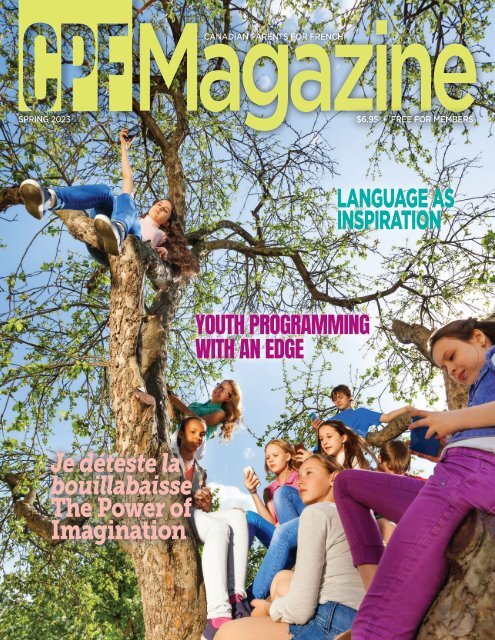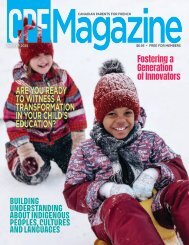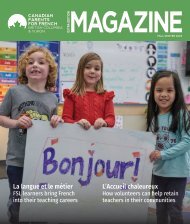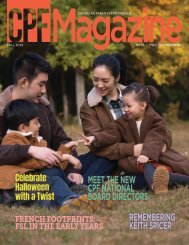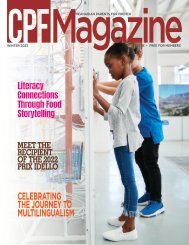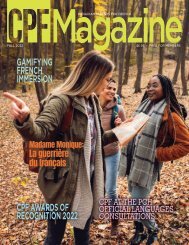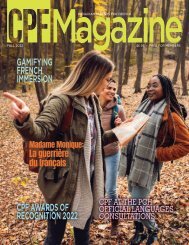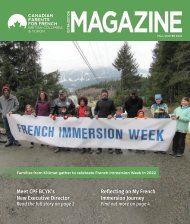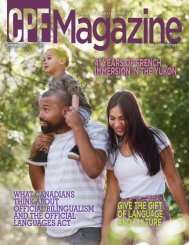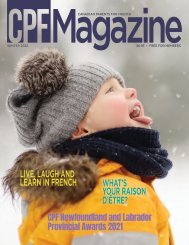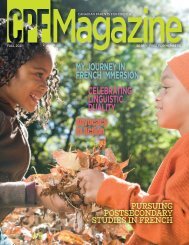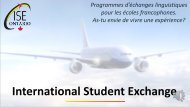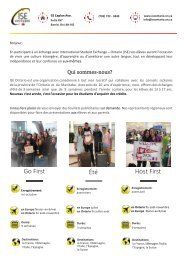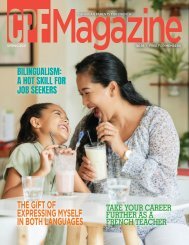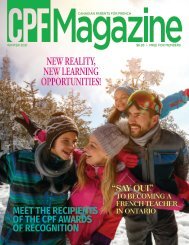CPF Magazine Spring 2023 Issue
A national network of volunteers, parents and stakeholders who value French as an integral part of Canada. CPF Magazine is dedicated to the promotion and creation of French-second-language learning opportunities for young Canadians.
A national network of volunteers, parents and stakeholders who value French as an integral part of Canada. CPF Magazine is dedicated to the promotion and creation of French-second-language learning opportunities for young Canadians.
- No tags were found...
Create successful ePaper yourself
Turn your PDF publications into a flip-book with our unique Google optimized e-Paper software.
SPRING <strong>2023</strong><br />
<strong>Magazine</strong><br />
$6.95 • FREE FOR MEMBERS<br />
CANADIAN PARENTS FOR FRENCH<br />
LANGUAGE AS<br />
INSPIRATION<br />
YOUTH PROGRAMMING<br />
WITH AN EDGE<br />
Je déteste la<br />
bouillabaisse :<br />
The Power of<br />
Imagination
<strong>Magazine</strong><br />
CANADIAN PARENTS FOR FRENCH<br />
SPRING <strong>2023</strong><br />
www.cpf.ca<br />
CONTRIBUTORS<br />
Douglas Vandor, Bryton McKinnon,<br />
and other authors and organizations,<br />
as noted in their articles.<br />
EDITORIAL MANAGER<br />
Marcos Salaiza<br />
GRAPHIC DESIGN<br />
Stripe Graphics Ltd.<br />
PRINTING<br />
Trico Packaging and Print Solutions<br />
SUBMISSIONS<br />
Canadian Parents for French<br />
1104 - 170 Laurier Ave. W.<br />
Ottawa, ON K1P 5V5<br />
(613) 235-1481, www.cpf.ca<br />
Advertising: Cathy Stone<br />
Canadian Parents for French<br />
Email: advertise@cpf.ca<br />
<strong>CPF</strong> <strong>Magazine</strong> is published three times per<br />
year for members of Canadian Parents for<br />
French. Our readership includes parents<br />
of students learning French as a second<br />
language, French language teachers,<br />
school board or district staff, and provincial,<br />
territorial and federal government staff<br />
responsible for official languages education.<br />
CHANGE OF ADDRESS<br />
To signal a change of address,<br />
contact Canadian Parents for French<br />
at (613) 235-1481, or email:<br />
cpf.magazine@cpf.ca<br />
Editorial material contained in this<br />
publication may not be reproduced<br />
without permission.<br />
Publications Mail Agreement No. 40063218<br />
Return undeliverable mail to Canadian<br />
Parents for French at the address above.<br />
To become an online subscriber, email<br />
cpf.magazine@cpf.ca. For an online version<br />
of this issue, visit www.cpf.ca.<br />
SPRING <strong>2023</strong><br />
Table of Contents<br />
FEATURES<br />
2 Action Plan for Official Languages <strong>2023</strong>-2028:<br />
Protection-Promotion-Collaboration<br />
3 Je déteste la bouillabaisse : The Power of Imagination<br />
and a Bilingual Journey<br />
8 Language as Inspiration<br />
15 Spotlight on a <strong>CPF</strong> Family: Meet the Kumars!<br />
REGULAR ARTICLES<br />
2 PRESIDENT’S MESSAGE<br />
6 <strong>CPF</strong> RESOURCES<br />
For the Love of French: Queen’s FSL<br />
Multi-Session Teacher’s Education Program<br />
10 <strong>CPF</strong> EVENTS<br />
<strong>CPF</strong> Network CEO, Nicole Thibault, Receives Knighthood<br />
in the Ordre des Palmes académiques<br />
12 <strong>CPF</strong> PARTNERS<br />
Youth Programming With An Edge: Over 55 Activities<br />
Offered Year-Round Both In-Person And Online<br />
18 This Summer, Host a Youth!<br />
20 KEY <strong>CPF</strong> CONTACTS ACROSS CANADA<br />
21 <strong>CPF</strong> ADVOCACY WORKSHEET<br />
Canadian Parents for French is a nationwide, research-informed, volunteer organization<br />
that promotes and creates opportunities to learn and use French for all those who<br />
call Canada home.
PRESIDENT’S MESSAGE<br />
L<br />
'été arrive, et la vie devient facile ! Can you<br />
believe we are almost halfway through the<br />
year? Time flies and at the <strong>CPF</strong> Network we are<br />
working on exciting things to keep advancing FSL<br />
education. This issue includes updates on some<br />
important initiatives of the Network. As usual, we<br />
have also included resources to support French<br />
language learning at home and interesting articles<br />
from our partners.<br />
Exciting opportunities are fast approaching<br />
as the government recently launched the new<br />
Action Plan for Official Languages <strong>2023</strong>–2028;<br />
and the highly anticipated modernization of the<br />
Official Languages will bring new challenges and opportunities,<br />
at the time of publication of this issue, Bill C-13 is being<br />
studied in the Senate after passing third reading in the House<br />
of Commons with near-unanimous support. We will continue<br />
providing updates as we keep advocating for more FSL learning<br />
opportunities.<br />
As for updates from the National Board, we<br />
are preparing for the <strong>CPF</strong> Leaders’ Networking<br />
Event which will take place July 7–9 in<br />
Gatineau, Québec. We are looking forward to<br />
meeting <strong>CPF</strong> Leaders from across the country<br />
to discuss the organization’s priorities and<br />
strategic directions.<br />
Stay tuned as <strong>CPF</strong> unveils new<br />
programming, volunteer opportunities and<br />
provides overall updates of the FSL landscape.<br />
To learn about the latest developments, make<br />
sure to follow us on social media. I wish you a<br />
great summer and as the end of the school year<br />
approaches, bonne fin de l’année scolaire ! n<br />
DERREK BENTLEY<br />
<strong>CPF</strong> NATIONAL PRESIDENT<br />
Action Plan for Official Languages <strong>2023</strong>-2028:<br />
Protection-Promotion-Collaboration<br />
O<br />
n April 26, the Honourable Ginette Petitpas Taylor,<br />
Minister of Official Languages, launched the<br />
new Action Plan for Official Languages <strong>2023</strong>-2028:<br />
Protection-Promotion-Collaboration.<br />
<strong>CPF</strong> attended the launch and was pleased with<br />
the new Action Plan as it builds on the Government of<br />
Canada’s previously established objective to increase<br />
the bilingualism rate of the Canadian population to 20%<br />
by 2036.<br />
The plan features investments that support French<br />
second-language learning and FSL teacher recruitment<br />
and retention, this will allow us to move forward with<br />
our mandate of furthering bilingualism by creating and<br />
promoting opportunities for youth to learn and use<br />
French. <strong>CPF</strong> was also pleased to see successful, existing<br />
programs expand their program scope to include<br />
immersion schools.<br />
It is important to note that the provincial and<br />
territorial governments will receive significant amounts<br />
under this Action Plan for the delivery of FSL education.<br />
We look forward to being part of the conversation, to<br />
being consulted and to working with the provinces and<br />
territories to invest these funds effectively to meet the<br />
needs of the largest number of families possible. n<br />
2 <strong>CPF</strong> MAGAZINE SPRING <strong>2023</strong>
Je déteste<br />
la bouillabaisse :<br />
The Power of<br />
Imagination<br />
and a Bilingual<br />
Journey<br />
BY DOUGLAS VANDOR, AUTHOR AND OLYMPIC ROWER<br />
continued...<br />
<strong>CPF</strong> MAGAZINE SPRING <strong>2023</strong> 3
I<br />
have always believed that following one's passion leads to<br />
success. I was passionate about rowing, and that passion<br />
steered me for 13 years on Canada’s Olympic Rowing Team.<br />
Writing is something that I am passionate about as well. I have<br />
been writing for as long as I can remember and I have always<br />
enjoyed the creativity that writing requires, as well as the<br />
process that it unleashes. Although it is a different form of<br />
exertion from rowing, it can be just as intense.<br />
As an Olympic athlete, writing provided a balance from<br />
my heavy training schedule. It was also a pastime that gave<br />
my aching muscles a respite from the endless kilometres<br />
rowing up and down the lake. Writing during my downtime<br />
put my brain to work, a change that I welcomed.<br />
When I hung up my oars, I traded them for a pen. Quite<br />
suddenly I found myself writing and getting paid to do so.<br />
The lessons I learned on the lake inevitably found themselves<br />
onto the pages of my manuscripts. My first children’s<br />
book, Salmon on Toast, was about perseverance. My second<br />
children’s book, I HATE BOUILLABAISSE!, is about the mind and the<br />
power of our imagination. In sport, the mind can be our ally<br />
or our foe. It can be the difference between a podium finish or<br />
fourth place. In life outside of sport, this is no different.<br />
I HATE BOUILLABAISSE!<br />
uses food at the dinner table<br />
to demonstrate that a child<br />
can choose to interpret what<br />
the mind sees as an obstacle<br />
or an opportunity.<br />
Negative thoughts can trickle into our consciousness and dictate<br />
our paths. And when the mind gets stuck in some of these darker<br />
places, it can make us nervous, anxious and even scared. But<br />
if we learn to work with the imagination instead of fighting it,<br />
these perceived challenges can sometimes seem less daunting.<br />
They can even be converted into opportunities.<br />
Sophie se laisse souvent emporter par son imagination,<br />
surtout quand il s’agit de nourriture. Elle a peur de manger les<br />
repas préparés par tante Annette, qui cuisine toujours des<br />
plats avec des noms longs et bizarres. Mais tout change lorsque<br />
Sophie réalise que les repas que lui sert son imagination sont<br />
ceux qu’elle avait vraiment voulus.<br />
D.J. Vandor est un rameur olympique retraité<br />
ainsi que diplômé de la Northwest Culinary<br />
Academy of Vancouver. Maintenant, chez<br />
lui à Vancouver, il passe son temps à écrire<br />
des histoires et à cuisiner des plats dont<br />
ses enfants n’ont jamais entendu parler.<br />
L’artiste Stefanie St. Denis, aussi connue<br />
sous le nom de Jupiters Muse, savoure le<br />
défi qu’est de transformer la parole écrite<br />
en images qui captent l’imagination. Ses<br />
illustrations enchantent les enfants depuis<br />
plus de quinze ans.<br />
4 <strong>CPF</strong> MAGAZINE SPRING <strong>2023</strong>
I HATE BOUILLABAISSE! uses food at the dinner table to<br />
demonstrate that a child can choose to interpret what the<br />
mind sees as an obstacle or an opportunity.<br />
Sophie’s imagination always plays tricks on her when it<br />
comes to the unfamiliar dishes that her aunt makes. She doesn’t<br />
recognize the names of the dishes nor how they look on her<br />
plate. Her imagination thus takes hold of her and changes<br />
her mood, it dictates her reactions. As the story progresses,<br />
however, Sophie starts to realize that the ridiculously yucky<br />
meals that she has been cooking up in her mind are the ones<br />
that she had been craving all along. She turns something that<br />
was initially negative into something that is positive by looking<br />
at it through a different lens. Her confidence and her self esteem<br />
are rewarded in turn; a lesson for us all. The situation didn’t<br />
change, Sophie just chose to look at it in a different way.<br />
I wrote the English version of the book first, but it was<br />
important to me for the book to be available in French as well<br />
(JE DÉTESTE LA BOUILLABAISSE!).<br />
I have been surrounded by bilingualism my entire life.<br />
Growing up in a small town in Québec, I would switch from<br />
English to French then back to English many times a day. I was a<br />
part of both the English and French communities and effortlessly<br />
flowed in and out of each culture. Whether at hockey practice,<br />
boy scouts or in the school yard during recess, both languages<br />
were needed in order to thrive. Instead of resisting learning ‘the<br />
other’ language, the earlier one became bilingual the better one<br />
could navigate and experience the entire community, not just<br />
a part of it. And, of course, food always provided an important<br />
gateway to sharing ideas between the English and the French<br />
communities. It was a way to create bridges between families<br />
and cement friendships that lasted generations.<br />
Living in both Montréal and Québec City as a young adult,<br />
it never ceased to amaze me how people switched back and<br />
forth between French and English so effortlessly. It was very<br />
common to hear one person on the street speaking French and<br />
the other person answering back to them in English, carrying<br />
on a conversation as if it was the most natural thing to do in the<br />
world. That is life in a bilingual community.<br />
In a way my wife and I are trying to recreate this experience<br />
for our own kids. They attend French school in Vancouver.<br />
They are completely bilingual and they were both born and<br />
raised on the West Coast! How cool is that? A testament to<br />
the importance of starting to learn languages at a young age.<br />
We expose them to both the English and the French<br />
cultures in Vancouver, in addition to the many other cultures<br />
that surround them, and they are encouraged to soak up as<br />
much of it as they want. This is our little contribution to<br />
bilingualism (and multiculturalism) in Canada.<br />
And, of course, I still make bouillabaisse every once in a<br />
while, for supper, with the hopes that one day they will enjoy<br />
it; they still hate it. And with copies of both I HATE BOUILLABAISSE!<br />
and JE DÉTESTE LA BOUILLABAISSE! on our bookshelf, they are now<br />
officially allowed to complain about my cooking, as long as they<br />
say it twice; once in English and once in French. n<br />
Living in both Montréal and Québec City as a young adult, it<br />
never ceased to amaze me how people switched back and<br />
forth between French and English so effortlessly. It was very<br />
common to hear one person on the street speaking French<br />
and the other person answering back to them in English,<br />
carrying on a conversation as if it was the most natural thing<br />
to do in the world. That is life in a bilingual community.<br />
<strong>CPF</strong> MAGAZINE SPRING <strong>2023</strong> 5
<strong>CPF</strong> RESOURCES<br />
For the Love<br />
of French<br />
Queen’s FSL Multi-Session Teacher’s<br />
Education Program<br />
BY BRYTON MCKINNON, TEACHER CANDIDATE, QUEEN’S UNIVERSITY (ONTARIO)<br />
6 <strong>CPF</strong> MAGAZINE SPRING <strong>2023</strong>
<strong>CPF</strong> RESOURCES<br />
For decades, Ontario, like much of Canada, struggled to recruit<br />
French speakers in schools. As French teacher numbers continue<br />
to dwindle due to the wave of baby boomer retirees, so too do<br />
recruitment numbers. In Kingston, a pre-existing yet uncommon<br />
model for teachers’ college was adopted to address this provincial<br />
and national crisis.<br />
In May of 2022, the inaugural cohort of<br />
teacher candidates entered Queen’s<br />
University’s FSL multi-session B.Ed.<br />
Program. I, along with 24 other French<br />
speaking teachers, are part of this new<br />
wave of educators who are pioneering<br />
how teachers’ colleges could operate.<br />
Once per month, we attend a<br />
three-day weekend of classes, lasting<br />
approximately 22 hours. We also complete<br />
two one-month long sessions in July.<br />
Meanwhile, we are full-time teachers.<br />
Yes, full-time teachers and also full-time<br />
students. And yes, we’re paid.<br />
In fact, after the first two semesters of<br />
our program, we qualify for the Temporary<br />
Certificate of Qualification and Registration<br />
(TCoQR).<br />
In short, this means that our salary<br />
changes to that of a recent graduate, as<br />
well as providing us job security; meaning,<br />
we can no longer be ousted by a fully<br />
certified teacher. With flexibility, we are<br />
able to have the best of both worlds:<br />
academia and work. Despite these selfevident<br />
perks, my cohort and I are often<br />
running at breakneck speed.<br />
We are in the trenches, completing<br />
assignments, report cards, behavior<br />
management, and class readings. We<br />
balance our lives between families, our<br />
schooling, and our education, all the<br />
while working towards our Bachelor of<br />
Education.<br />
Thankfully, we have had a plethora<br />
of flexible and compassionate professors<br />
who adapt to our challenges, and offer<br />
flexibility as we spin ten plates at once.<br />
So how did this program come into<br />
existence? Queen’s partnered with the<br />
Eastern Ontario Staff Development Network<br />
(EOSDN) which includes 13 school boards<br />
from Durham to Ottawa, This means that all<br />
of our teachers are completing long-term<br />
occasional vacancies across the province.<br />
Interestingly, this program took<br />
flight quite quickly. In 2022, funding was<br />
secured in March with the green light<br />
being given. In April, school boards were<br />
contacted and administrators were tasked<br />
with nominating French educators in their<br />
schools who were working as uncertified<br />
teachers, supply staff and Early Childhood<br />
Educators. Personally, I received an email in<br />
mid-April, was on the phone with a EOSDN<br />
contact later that day, and was admitted<br />
into the program in the same phone call.<br />
Two weeks later in May, I started.<br />
As previously mentioned, we are<br />
not the first group of teacher candidates<br />
to undergo this multi-session approach.<br />
Queen’s began this model in the 1970s<br />
with the Technology Education program.<br />
This meant that people who had years of<br />
experience in their specific craft were able<br />
to transition into teaching without having to<br />
compromise the ability to make an income.<br />
My cohort of French speakers,<br />
however, are the first of our kind,<br />
attempting to address a shortage of French<br />
teachers. Some of us come from Quebec;<br />
others graduated from French immersion<br />
secondary schools; others, like myself,<br />
are francophiles with degrees in French<br />
literature or have lived abroad in France.<br />
Regardless of how French entered<br />
our lives, we have two things in common:<br />
we love teaching, et on parle en français.<br />
Our levels of French differ, but all of us<br />
are dedicated to improving our own<br />
knowledge of the diverse cultures of<br />
French and the language itself. Our<br />
Teachers’ College curriculum reflects this.<br />
We are expected to not only complete<br />
assignments and readings, but genuinely<br />
participate in French cultures. Many<br />
of our classes are in French, at least<br />
whenever there are available francophone<br />
professors.<br />
For those who have a background<br />
in French, and have wanted to enter<br />
education, but were held back by the<br />
necessity to continue earning a living wage,<br />
this program is likely for you. Unfortunately,<br />
the days of getting admitted via a phone<br />
call are long gone. Just like everywhere else,<br />
prospective teacher candidates now need<br />
to apply to Ontario Universities' Application<br />
Centre. As well, it is encouraged to already<br />
have some experience in classrooms. And<br />
as a French educator, there are school<br />
boards across the province who will accept<br />
uncertified French speakers into schools.<br />
If we as a country are dedicated<br />
to bilingualism, it needs to start in our<br />
schools. But unless our teacher education<br />
programs increase the number of French<br />
graduates, the French teacher shortage crisis<br />
is only going to widen until the conversation<br />
transitions from “˙How do we increase<br />
numbers” to “Which schools are going on<br />
the chopping block.” Thankfully, universities<br />
like Queen’s are leading the charge, and the<br />
FSL-Multi-Session program demonstrates<br />
how desperation breeds innovation. n<br />
<strong>CPF</strong> MAGAZINE SPRING <strong>2023</strong> 7
Language as<br />
Inspiration<br />
BY JOANNE LECLAIR, COMMUNICATIONS ADVISOR, LANGUAGE PORTAL DIVISION,<br />
TRANSLATION BUREAU PUBLIC SERVICES AND PROCUREMENT CANADA<br />
THIS ARTICLE WAS FIRST PUBLISHED ON JUNE 13, 2022, IN THE LANGUAGE PORTAL OF CANADA’S OUR LANGUAGES BLOG.<br />
A TRANSLATION BUREAU INITIATIVE, THE LANGUAGE PORTAL PROVIDES CANADIANS WITH A WIDE RANGE OF RESOURCES<br />
TO HELP THEM COMMUNICATE MORE EFFECTIVELY IN ENGLISH AND FRENCH, AND PUBLISHES WEEKLY ARTICLES BY<br />
LANGUAGE LOVERS ON THE OUR LANGUAGES BLOG.<br />
https://www.noslangues-ourlanguages.gc.ca/en/blogue-blog/langue-porteuse-dinspiration-language-as-inspiration-eng<br />
8 <strong>CPF</strong> MAGAZINE SPRING <strong>2023</strong>
In honour of National Indigenous Peoples Day (June 21st), meet Inuk singer-songwriter and producer Elisapie Isaac. Elisapie was<br />
a spokesperson of the Rendez-vous de la Francophonie last year. When we met her, she told us how the different languages she<br />
speaks inspire her and introduced us to the artists who have influenced her. Here’s a glimpse into her creative universe.<br />
Benefits of speaking different languages<br />
When she was very young, Elisapie’s parents decided that she<br />
would learn French. She fondly remembers her elementary<br />
school teachers, who shared their passion for the language.<br />
Today, she lives in Montreal and speaks French by choice,<br />
out of love and out of respect for those around her.<br />
“I speak French out of love and out of a desire to connect<br />
with others. It’s not just about the language for me. Language<br />
brings with it enormous breadth and culture; it expands my<br />
world. I love speaking French. I love the different possibilities<br />
the language has to offer, because that’s all I want to do,<br />
express myself! It’s like I can never express myself enough!<br />
It’s a yearning, a visceral need that is part of my personality.<br />
Speaking Inuktitut, French and English allows me to play with<br />
words. All the vocabulary that is available to me allows me to<br />
better express myself.”<br />
The philosophy and culture behind Indigenous languages<br />
If you want to learn an Indigenous language, Elisapie suggests<br />
you start by learning more about Indigenous Peoples and<br />
communities across Canada. She believes that learning a new<br />
language requires human interaction and cultural immersion.<br />
Elisapie also stresses the importance of humility, curiosity and<br />
the desire to connect with others. She explains that real human<br />
connection and knowledge transfer are essential to learning a<br />
new language.<br />
“To be honest, learning Indigenous languages is challenging.<br />
It is far more meaningful and important to build relationships<br />
with people than to learn the language.... Just start by becoming<br />
aware of Indigenous culture and philosophy. For example, learn<br />
about the nation that lives where you grew up. I think that<br />
would be a good start.”<br />
Language and inspiration<br />
On her latest album, Elisapie sings mostly in Inuktitut, but also<br />
in English and French. Emotion drives inspiration, and Elisapie<br />
instinctively knows which language to use to express intensity,<br />
turmoil or tenderness. Allowing her instincts to guide her, she<br />
moves from one language to another with ease. Each language<br />
has its own unique purpose and energy. At first she found it<br />
difficult to blend pop music and Inuktitut, but over time she<br />
has found a comfort level and struck a balance between rhythm<br />
and language. She feels that French offers a more structured<br />
way of creating.<br />
“I find French very complex. I’m instinctive, but it quickly<br />
becomes very clear to me what the subject is and which audience<br />
I want to reach. For example, in my French song Ton vieux nom,<br />
co written with Natasha Kanapé Fontaine, I felt the lyrics were for<br />
Quebec and French-speaking audiences. They were the ones<br />
I wanted to speak to and reach out to. The song provided a space<br />
for dialogue with the people that know me and that I interact<br />
with every day.”<br />
The singer-songwriter doesn’t spend hours thinking, with<br />
pen in hand. She admits that she creates instinctively, letting<br />
herself be carried away by what she’s feeling at that very<br />
moment. Her songs take shape in the language that emerges.<br />
“When I write, I ask myself: ‘Does it come out naturally in<br />
English, French or Inuktitut?’ I rely on instinct to tell me which<br />
language to choose. Lately, I often write in English or Inuktitut.<br />
These languages offer me a range of emotions that I find easier<br />
to make my own, a wider universe perhaps.”<br />
Literature that inspires<br />
When asked which writings or literary figures have influenced<br />
her life, the singer-songwriter took a moment to consider. “There<br />
have been so many!” The first person she names is author Frank<br />
McCourt, whose autobiographical writings caught her attention.<br />
In reading his work, Elisapie clearly saw a connection between<br />
the life McCourt describes and the lives of Indigenous Peoples.<br />
“I felt like I could understand who the Irish were. This is<br />
an author who writes about poverty and his dysfunctional<br />
relationship with his alcoholic father, but he writes with a lot<br />
of humour at the same time. For me, it was like reading the<br />
words of an Indigenous writer who is also trying to survive in<br />
the dysfunction but who has a good head on their shoulders<br />
and the strength of mind to say, ‘I’m going to get through this,<br />
I’m going to find a way.’”<br />
Elisapie then mentions Joséphine Bacon’s poetry, which<br />
moves her deeply and brings her a sense of peace. She considers<br />
the poet from Pessamit, Quebec, to be a wise woman. She is<br />
particularly fond of works that pay tribute to the Innu territory<br />
and loves those that deal with aging and the passage to the<br />
status of Elder.<br />
“I think that anyone who is aging should read Joséphine<br />
Bacon because there is an incredible fear of aging in society.<br />
For Indigenous Peoples, it’s the opposite. There’s something<br />
beautiful about surrendering to time, becoming wise, guiding<br />
others. It’s a wonderful role that is given to us. I feel that we<br />
should all learn from Joséphine Bacon … She’s had a big impact<br />
on me.”<br />
Another work that has moved Elisapie is L’énigme du retour<br />
[The Return] by Danny Laferrière.<br />
“I felt like he was telling my life story. He speaks about<br />
exiles, but sometimes we can feel like exiles here in our<br />
own country.”<br />
We encourage you to read or reread the post Elisapie:<br />
A woman who cherishes tradition, which shows another<br />
side of Elisapie Isaac, and to keep up to date with Elisapie,<br />
an artist whose creative universe touches people from<br />
different backgrounds. n<br />
<strong>CPF</strong> MAGAZINE SPRING <strong>2023</strong> 9
<strong>CPF</strong> EVENTS<br />
<strong>CPF</strong> Network CEO<br />
Nicole Thibault<br />
Receives Knighthood in the<br />
Ordre des Palmes académiques<br />
Canadian Parents for French Network CEO, Nicole Thibault’s<br />
longstanding contributions to the advancement of French<br />
as a second language education in Canada were recognized<br />
last March with her investiture as a Knight (Chevalier) in the<br />
Ordre des Palmes académiques. The order is an honour that<br />
recognizes excellence in teaching and promotion of the French<br />
language and culture. It is bestowed by the French Republic and<br />
is one of the oldest civil honours.<br />
Ms. Thibault strongly believes that learning French is a<br />
benefit for all Canadians and has over 30 years of experience<br />
working to ensure all students in Canada have an opportunity<br />
to access and learn their second official language. From<br />
being a French immersion teacher, educational consultant<br />
and vice principal and continuing her career with leadership<br />
roles to advocate for FSL education, she has dedicated her<br />
life to the French language, as such, the honour is deeply<br />
personal.<br />
<strong>CPF</strong> was delighted with the news as Ms. Thibault has led<br />
important initiatives to strengthen the organization and has<br />
meaningfully impacted the FSL learning landscape in her role.<br />
His Excellency Michel Miraillet, Ambassador of France to Canada presenting the honour to Ms. Thibault.<br />
10 <strong>CPF</strong> MAGAZINE SPRING <strong>2023</strong>
<strong>CPF</strong> EVENTS<br />
“<br />
I am humbled with this honour and gratified to join other notable Canadians who<br />
have received this distinction. Pursuing my passion of actively promoting French<br />
learning and education has allowed me to work alongside and be surrounded<br />
by passionate and inspiring leaders – and while my name is being decorated,<br />
I am receiving this honour as part of a collective work that I share with past<br />
and present Board volunteers and staff of CASLT, <strong>CPF</strong> as well as visionaries<br />
who have served the Official Languages Branch of Canadian Heritage.<br />
”<br />
– Nicole Thibault, <strong>CPF</strong> Network CEO<br />
“We believe this prestigious honour and recognition<br />
of Ms. Thibault’s career are well deserved. We are<br />
very proud of this important achievement and all her<br />
accomplishments. Her contributions have made a longlasting<br />
impact not only on our organization but on FSL<br />
education and the country,” said Derrek Bentley, <strong>CPF</strong><br />
National President.<br />
The honour of Chevalier (knight) was awarded to<br />
Ms. Thibault by His Excellency, the Ambassador of France<br />
to Canada, Mr. Michel Miraillet, in an official ceremony<br />
held at the Embassy of France on March 28.<br />
The Ordre des Palmes académiques was originally<br />
established in 1808 by Emperor Napoleon I to honour<br />
distinguished members of the University of Paris. It<br />
became an order of merit in 1955.<br />
The prestigious honour is bestowed on noteworthy<br />
individuals of the educational community, in France<br />
and abroad, who have made important contributions to<br />
education, science and universities, while also promoting<br />
the French language. n<br />
Betty Gormley (<strong>CPF</strong> Ontario), Michael Tryon (<strong>CPF</strong> Alberta), Nicole Thibault<br />
and Derrek Bentley (<strong>CPF</strong> National President).<br />
Chantal Bourbonnais, Executive Director of the Association<br />
Canadienne des professionnels de l'immersion (ACPI) also<br />
received knighthood in the Ordre.<br />
<strong>CPF</strong> Network office staff<br />
<strong>CPF</strong> MAGAZINE SPRING <strong>2023</strong> 11
<strong>CPF</strong> PARTNERS<br />
Youth Programming With An Edge:<br />
Over 55 Activities Offered Year-Round<br />
Both In-Person And Online<br />
The TD-Blue Metropolis Children’s Festival is supported by TD Bank Group.<br />
The TD-Blue Metropolis Children's Festival runs all year long,<br />
offering young readers month after month of reading fun,<br />
along with the endless benefits of reading to boot! Between<br />
September and June, the Festival presents over 55 themed<br />
activities for children, youth, and families to enjoy in<br />
person and online. Discover all that Blue Metropolis<br />
has to offer!<br />
GO TO BLUE MET ON THE WEB<br />
For a few years already, ecology and numbers have been on our<br />
mind at Blue Metropolis.<br />
Our Numbers Spelled Out platform proposes rich content<br />
tackling themes related to math, money, saving, spending, and<br />
what things are worth, adapted for various age groups. What’s<br />
more, our Young Ecologist Club series presents original content<br />
on the expansive subject of the environment. Both series feature<br />
quizzes, podcasts, and reading suggestions for the whole family,<br />
available via the Blue Metropolis website.<br />
Each platform features a rich lineup of authors, including<br />
Bonnie Farmer, Fabienne Gagnon, Catherine Austen,<br />
Dominique de Loppinot, and André Marois for Numbers Spelled<br />
Out, and Andrew Katz, Elise Moser, Sylvain Rivard, and Mireille<br />
Messier for the Young Ecologists Club.<br />
New in <strong>2023</strong>: Discover our various edutainment activity sheets, a<br />
series of playful and educational exercises that children can do<br />
on their own or with their parents to improve their academic<br />
skills while still having fun!<br />
12 <strong>CPF</strong> MAGAZINE SPRING <strong>2023</strong>
<strong>CPF</strong> PARTNERS<br />
BEAUTIFUL REGIONS<br />
We’re thrilled to present the inaugural edition of the new Simply<br />
Fabulous! series thanks to the support of the Caisse de dépôt et<br />
placement du Québec.<br />
Children’s literature knows no borders, not even regional<br />
ones! All over Quebec, authors are living, writing and illustrating<br />
books for young people to devour. Their imaginations feed on<br />
the beauty of the landscapes around them, places often echoed<br />
in their novels and picture books.<br />
Our new series aims to highlight the work of children’s<br />
authors working across Quebec. For this first edition of<br />
the series, we asked three authors to write an original text<br />
about their corner of the province. Amy Lachapelle, Carolyn<br />
Chouinard, and Keven Girard wrote original pieces about their<br />
respective regions, the Abitibi-Témiscamingue, the Chaudière-<br />
Appalaches, and the Saguenay–Lac-St-Jean. Their texts were<br />
then recorded by professional voice actors Jeanne Bellefeuille,<br />
Élisabeth Sirois and Louise Portal. The written and podcast<br />
versions of the texts are available on the Blue Metropolis<br />
website.<br />
To mark the return of spring, the three authors also visited<br />
school children in their respective regions to present their texts,<br />
share a few thoughts with youths and to encourage them to<br />
participate in our exciting new contest: “Tell us about your region’’.<br />
Set to officially launch on May 16, this contest includes two<br />
ways to enter: with written texts (texts must be submitted in<br />
French), and with photos.<br />
Full contest details are available on our website: https://<br />
metropolisbleu.org. Visit us and follow us on social media for<br />
more info. We have lots more on offer as part of this special<br />
project, including a fun quiz and reading recommendations<br />
featuring regional authors!<br />
<strong>CPF</strong> MAGAZINE SPRING <strong>2023</strong> 13
<strong>CPF</strong> PARTNERS<br />
CHILDCARE AND DAYCARE DAYS<br />
Early childhood educators are superheroes. They work in childcare<br />
centres and daycares and play a crucial role in the life and general<br />
development of young children. Each year since 2016, the TD-Blue<br />
Metropolis Children’s Festival organizes two Childcare and Daycare<br />
Days to highlight educators’ contribution to the growth and wellbeing<br />
of preschoolers.<br />
We invite educators to take part in theme-based days on social<br />
and educational issues that can be adapted to the very young. In<br />
2022-<strong>2023</strong>, the themes were Numeracy and Ecology.<br />
All an educator has to do is select a picture book from the daycare<br />
library, or from our suggested reading list, and read the children a story<br />
that deals with the day’s theme. Naturally, we’re always thrilled to get<br />
photographs and comments from their event!<br />
Childcare centres and daycares that register for the event are<br />
automatically entered in a draw for 2 gift certificates worth $300 each,<br />
redeemable at an independent bookstore in their region.<br />
More importantly, the series helps increase children’s awareness<br />
of various issues and promotes their academic success.<br />
TWO EXCITING EDUCATIONAL PROGRAMS<br />
The Blue Metropolis Foundation offers bilingual educational programs<br />
each year to raise kids’ awareness of various issues and encourage<br />
them to speak out. This year, two programs were available to children<br />
and youth in French- and English-language schools across Quebec.<br />
Veggie Patch Adventurers offered participating students a unique<br />
second-language learning experience based on literature, cooking, and<br />
ecology. Participants had the opportunity to team up to compose a<br />
bilingual song that was made into a professional video. The video will<br />
be launched in May <strong>2023</strong> on our website.<br />
Quebec Roots was also in full swing for a 17th consecutive year.<br />
This always popular educational program was offered to young Anglo-<br />
Quebecers in seven classes from seven different schools. Last fall,<br />
participating students were mentored by professional writers and<br />
photographers who helped them express what they face in their own<br />
lives. The students’ texts and photos have been gathered and published<br />
in a book and exhibition. The book can be downloaded on the project<br />
web page: https://metropolisbleu.org/roots.<br />
GOOSEBUMPS FOR HALLOWEEN<br />
Each Halloween since 2020, Blue Metropolis has presented numerous activities<br />
on themes bound to pique the interest of parents and little ones alike. In fall<br />
<strong>2023</strong>, Blue Metropolis will be adding new podcasts to its collection of spooky<br />
stories and will also offer a major writing contest for kids aged 9 to 12.<br />
THE ADVENTURE CONTINUES IN <strong>2023</strong>-2024!<br />
Follow us on our social media and check out our website regularly for<br />
the latest at Blue Met and for news on our 2024 programming. Visit www.bluemetropolis.org/youth<br />
14 <strong>CPF</strong> MAGAZINE SPRING <strong>2023</strong>
Spotlight on a <strong>CPF</strong> Family:<br />
Meet the Kumars!<br />
<strong>CPF</strong> MAGAZINE SPRING <strong>2023</strong> 15
“ I highly recommend the services<br />
offered by <strong>CPF</strong> to other parents who<br />
wish to support their kids journey<br />
to bilingualism.”<br />
Sumeet Kumar, a husband, a father,<br />
a parent, and now an avid <strong>CPF</strong><br />
Volunteer has shared how Canadian<br />
Parents for French Ontario (<strong>CPF</strong> Ontario)<br />
played a significant role in advancing<br />
French learning for his daughter Aarohi.<br />
Sumeet and his wife Puja have been<br />
active in advocating for their daughter<br />
and supporting <strong>CPF</strong> Ontario’s mission.<br />
They even drove the almost 15 hours<br />
from Thunder Bay to <strong>CPF</strong> Ontario’s<br />
Blue Mountain Family Event and<br />
AGM last year!<br />
In the middle of the pandemic, Sumeet<br />
and Puja wanted to put Aarohi, their<br />
youngest daughter, in French immersion<br />
but were hesitant. She was about to start<br />
Grade 3 at Elsie MacGill Public School in<br />
Thunder Bay, Ontario with zero previous<br />
French experience.<br />
Believing strongly in their child’s abilities<br />
and really wanting her to have this<br />
bilingual advantage, and the opportunities<br />
to come, these newly Canadian parents<br />
pushed for solutions.<br />
Thinking that maybe a tutor could help,<br />
they started looking, and landed on the<br />
<strong>CPF</strong> website.<br />
They called Rosemary Sutherland, <strong>CPF</strong><br />
Ontario’s Chapter Development and<br />
Outreach Manager asking about <strong>CPF</strong><br />
programs and what could be done.<br />
Aarohi started in Reading Circle and<br />
Franco-Fun so that she experienced<br />
French twice a week while starting FI.<br />
“It was very helpful for her because it was<br />
learning through fun,” said Sumeet.<br />
“We spoke with Rosemary about possible<br />
tutoring on top of the <strong>CPF</strong> activities,<br />
so now she had French 3 times a week<br />
outside the classroom.”<br />
By the time June of that school year came<br />
along, Aarohi surprised even her teacher<br />
with how well her progress went from<br />
zero French to a level 18 reading!<br />
“We were so happy with how much she<br />
learned in just 1 year,” said the Kumars.<br />
“The virtual one-on-one sessions,<br />
Franco-Fun activities, Reading Circles,<br />
Baking workshops, and the WebPals<br />
Program organized by <strong>CPF</strong>, along with<br />
constant encouragement provided by the<br />
instructors, were key enablers that have<br />
been instrumental in my daughter’s ability<br />
to learn French,” said Sumeet.<br />
“I highly recommend the services<br />
offered by <strong>CPF</strong> to other parents who<br />
wish to support their kids journey to<br />
bilingualism.”<br />
Programs offered by <strong>CPF</strong> Ontario:<br />
ONLINE PROGRAM<br />
16 <strong>CPF</strong> MAGAZINE SPRING <strong>2023</strong>
About Their<br />
Involvement<br />
with <strong>CPF</strong><br />
When asked about his and his wife’s<br />
volunteering and involvement with <strong>CPF</strong>,<br />
Sumeet took no credit. “Well, I don’t do<br />
very much, but my wife Puja joined the<br />
school as a lunch supervisor and made<br />
a really positive impact and connection<br />
with everyone there,” he said.<br />
“Puja is like a liaison between the school<br />
and Rosemary from <strong>CPF</strong>.” He explained<br />
that through a great communications<br />
tool called “Seesaw” the school was able<br />
to communicate with teachers, students<br />
and parents and keep them up to date<br />
with any programs <strong>CPF</strong> Ontario was<br />
offering for students online.<br />
“So, I would get the <strong>CPF</strong> Ontario<br />
Communiqué and then give it to Puja to<br />
share with the school,” said Sumeet.<br />
“Then the principal often posted <strong>CPF</strong><br />
posters to promote these opportunities<br />
for the parents to register their kids in<br />
French practice.” That’s a great thing to<br />
do as a volunteer, to act as a conduit to<br />
the school so more <strong>CPF</strong> opportunities<br />
reach more parents and students! n<br />
If you would like<br />
to find out more<br />
about volunteering<br />
or <strong>CPF</strong> programs,<br />
visit https://cpf.ca/<br />
en/participate.<br />
Université d’Ottawa | University of Ottawa<br />
FRENCH IMMERSION<br />
at uOttawa<br />
The next step in<br />
bilingual education!<br />
• French immersion available in 75 undergraduate programs<br />
• All FSL students are eligible<br />
• Special courses to make the transition to bilingual<br />
university studies<br />
• An extra $1,000 per year for studying bilingually<br />
• An authentic bilingual environment in Canada’s capital<br />
immersion@uOttawa.ca<br />
www.immersion.uOttawa.ca<br />
<strong>CPF</strong> MAGAZINE SPRING <strong>2023</strong> 17
<strong>CPF</strong> PARTNERS<br />
This Summer,<br />
Host a Youth!<br />
The YMCA Summer Work Student<br />
Exchange Program In a Nutshell<br />
Do you know a 16 or 17-year-old who needs a plan for this summer? The YMCA Summer Work Student Exchange (SWSE)<br />
program offers the opportunity to travel to a new community in Canada, gain paid job experience and practise a second<br />
official language. Our program staff will find accommodations for youth participants in their new community, organize<br />
and arrange all the travel tickets, and secure a paid job position in a non-profit organization for precious work experience.<br />
How the Program Can Shape a Teen’s Future<br />
Sanjana has been involved with the SWSE program since 2015, first as a youth participant and then as a SWSE staff<br />
member. We asked her to share what made her want to join and, eventually, work to support this program.<br />
When I was 16 years old, a poster changed my life. My eleventh-grade French teacher put<br />
one up in our classroom that promised the “experience of a lifetime.” And as someone who<br />
absolutely loves a good adventure, I knew I had to sign up. Before I knew it, I was on<br />
my way to Montreal with the SWSE Program!<br />
For six weeks, I had the most exhilarating and indescribable adventure full of<br />
laughter, challenges, and amazing memories I will never forget. My favourite activity<br />
of all was our last one, where our coordinators told us all to dress up and took us<br />
on a boat cruise! We danced the night away, and even years later, I remember it<br />
as one of the best nights of my life.<br />
Eventually, my family became a host through the program. And when my sister<br />
was old enough, she went on an exchange too. We went to two completely different<br />
cities, but she had the same unforgettable summer I did.<br />
Knowing how SWSE could change entire families’ lives, I decided to apply as a<br />
local coordinator. Three years later, I can honestly say it has been the most rewarding<br />
job I have ever had. I met some of my closest friends through SWSE and I feel like this<br />
program and the people I met through it shaped who I am today. I learned to be more<br />
confident in myself, to take chances, and most importantly, to be open to new experiences<br />
and challenges.<br />
If you know a teenager who could be interested by the SWSE program,<br />
share the program homepage: swse.ymcagta.org<br />
18 <strong>CPF</strong> MAGAZINE SPRING <strong>2023</strong>
<strong>CPF</strong> PARTNERS<br />
Newfoundland Family Opens Its Doors to Quebec Teens<br />
During six weeks in July and August, families with teenagers participating in the program welcome one another in their home.<br />
Unfortunately, not all families with youth in the program can host due to accessibility reasons such as health, work schedules or<br />
language barriers. To allow teenagers from different backgrounds to participate, a network of families called “Alternate Exchange<br />
Hosts” generously welcome participants in their home and make the SWSE program accessible.<br />
Melissa, Paul, and their two daughters Scarlett and Carrie from St. John’s, Newfoundland participated in the program a few<br />
years ago as one of the SWSE Alternate Exchanges Host. They had a wonderful experience opening up their home during summer<br />
to two exchange students from Quebec. Hundreds of families like Melissa and Paul decide to support the program by welcoming<br />
youth is their home. Often, the young participants become part of the family and they create bonds with their hosts that last for a<br />
lifetime. Here’s what Melissa wanted to share:<br />
In spring, I heard about Alternate Exchange Hosts for the YMCA Summer<br />
Work Student Exchange program in St. John’s. We have a spare bedroom<br />
in our house so I thought to myself, “why not?” We have a little girl named<br />
Scarlett who will be starting French Immersion in September and one day,<br />
maybe she’ll want to participate in these types of programs.<br />
We started looking into how we could help. The thing that really sealed<br />
the deal was that we’d be giving youth in our community a chance to travel.<br />
Signing on as alternate hosts meant there would be a space available here<br />
to welcome a student on exchange from somewhere else – which meant a<br />
youth in our community would have an opportunity to explore somewhere<br />
new. It felt great knowing we were doing the right thing!<br />
The excitement really kicked in when we went to the student and<br />
parent meeting, where we got to meet the other families and youth<br />
participating in the exchange. We also received the profiles of the youth<br />
we’d be hosting: Édouard and Mayika.<br />
The profiles said Édouard was a star soccer player, so I got him a<br />
volunteer coaching position with our local soccer club. It was nice to be<br />
able to help him make further connections in areas he was interested in<br />
outside of his work.<br />
Hosting Édouard and Mayika in our home during July and August<br />
was wonderful. They really became part of our family and we loved<br />
spending time with them. One of the fun little moments was taking<br />
them grocery shopping. We’d have them pick out things they liked to<br />
make their experience more familiar and welcoming.<br />
We also liked to tag along and participate in the weekend activities<br />
that the local coordinator had set up for the youth. It was a great<br />
opportunity to spend more time with them and include our own children<br />
as well. We went along for visits to museums, summer festivals, nature<br />
parks, and more. We also took them to our local amusement fair and to<br />
a traditional kitchen/deck party. Our girls got to make so many great<br />
memories with Édouard and Mayika.<br />
Overall, our YMCA Summer Work Student Exchange experience<br />
was exciting and fulfilling. We made many memories together and had<br />
a wonderful summer.<br />
Do you want to host a youth and help them learn French this summer?<br />
Welcome a SWSE participant into your home! This year’s exchange dates<br />
are July 1 to August 12.<br />
For more information and apply, visit the SWSE program family<br />
& hosting webpage. If you want to contact our team please email<br />
info-swse@ymcagta.org or call +1-877-639-9987.<br />
<strong>CPF</strong> MAGAZINE SPRING <strong>2023</strong> 19
KEY <strong>CPF</strong> CONTACTS ACROSS CANADA<br />
Network Office<br />
1104 - 170 Laurier Ave. W., Ottawa, ON K1P 5V5<br />
T: 613.235.1481<br />
cpf@cpf.ca cpf.ca<br />
Quebec Office & Nunavut Support<br />
P.O. Box 393 Westmount, Westmount, QC H3Z 2T5<br />
infoqcnu@cpf.ca qc-nu.cpf.ca<br />
British Columbia & Yukon<br />
227-1555 W 7th Ave., Vancouver, BC V6J 1S1<br />
T: 778.329.9115 TF: 1.800.665.1222 (in BC & Yukon only)<br />
info@cpf.bc.ca bc-yk.cpf.ca<br />
Alberta<br />
211-15120 104 Ave. NW, Edmonton, AB T5P 0R5<br />
T: 780.433.7311<br />
cpfab@ab.cpf.ca ab.cpf.ca<br />
Northwest Territories<br />
#211, 15120 - 104 Avenue NW, Edmonton, AB T5P 0R5<br />
cpfnwt@nwt.cpf.ca nwt.cpf.ca<br />
Saskatchewan<br />
303-115 2nd Ave. N., Saskatoon, SK S7K 2B1<br />
T: 306.244.6151 TF: 1.800.561.6151 (in Saskatchewan only)<br />
cpfsask@sasktel.net sk.cpf.ca<br />
Manitoba<br />
101-475 Provencher Blvd., Winnipeg, MB R2J 4A7<br />
T: 204.222.6537 TF: 1.877.737.7036 (in Manitoba only)<br />
cpfmb@cpfmb.com mb.cpf.ca<br />
Ontario<br />
103-2055 Dundas St. E., Mississauga, ON L4X 1M2<br />
T: 905.366.1012 TF: 1.800.667.0594 (in Ontario only)<br />
info@on.cpf.ca on.cpf.ca<br />
New Brunswick<br />
PO Box 4462, Sussex, NB E4E 5L6<br />
T: 506.434.8052 cpfnb@cpfnb.net nb.cpf.ca<br />
Nova Scotia<br />
8 Flamingo Dr., Halifax, NS B3M 4N8<br />
T: 902.453.2048 TF: 1.877.273.5233 (in Nova Scotia only)<br />
cpf@ns.sympatico.ca ns.cpf.ca<br />
Prince Edward Island<br />
PO Box 2785, Charlottetown, PE CIA 8C4<br />
T: 902.368.3703 ed@cpfpei.pe.ca pei.cpf.ca<br />
Newfoundland & Labrador<br />
PO Box 8601, Stn A, St. John’s, NL A1B 3P2<br />
T: 709.579.1776 ed@cpfnl.ca nl.cpf.ca<br />
TF: 1.877.576.1776 (in Newfoundland & Labrador only)<br />
20 <strong>CPF</strong> MAGAZINE SPRING <strong>2023</strong>
<strong>CPF</strong> ADVOCACY WORKSHEET<br />
Introducing French to our Babies,<br />
Toddlers, and Preschoolers<br />
There is no downside to being bilingual – and the best time to start is early!<br />
Research has shown that babies raised in bilingual environments develop stronger core cognitive skills<br />
like decision-making and problem-solving – even before they speak. Executive brain functions are key<br />
to success in school, and academic success is a big indicator of long-term wellbeing. Prepare your<br />
child for successful experiences as they grow, learn and transition to school.<br />
The best part is that you can raise a bilingual child even if you are not bilingual:<br />
> Incorporate French into your daily life. Normalizing hearing and using French at home will increase<br />
everyone’s comfort level. Play French radio stations. Watch French or bilingual children’s TV programming<br />
or cartoons (mini-TFO, Passe-Partout, change to French in Netflix and Disney). Listen to French podcasts<br />
for bedtime stories (Bododo on Ohdio, CBC/RC). Make a sensory bin filled with items for your child to<br />
explore – practise naming items in French.<br />
> Treat bilingualism as an asset. Lots of French words make their way into English. Point out these words<br />
as you encounter them. Introduce common expressions and commands. Bravo! Attention! Bon appétit!<br />
Bon voyage! À la mode… Celebrate moments when French pops up in daily life!<br />
> Introduce French through music. Singing, counting, and simple nursery rhymes help to introduce sounds,<br />
words and patterns as well as build the ability to process other auditory input, thus helping retain new<br />
words and structures.<br />
> Visit your public library regularly. Sign out and read French or bilingual audio picture books. Attend French<br />
story times as a family. Read the stories aloud in your home language and then again in French. Explore your<br />
community. Look for French on signage or complete a neighbourhood scavenger hunt to learn vocabulary<br />
in French. Visit: amelieisabelle.com/cherche-et-trouve<br />
> Download French apps (Boukili, Idéllo) or play games on French educational websites. Many apps are free<br />
and make learning French fun using a game-like approach. These types of tools do tend to require reading,<br />
but also incorporate visual and auditory cues.<br />
> Encourage other adults in your child’s life who speak French – friends, neighbours, youth leaders, relatives –<br />
to strike up simple conversations with your child, reinforcing basic greetings and sharing on a few commonly<br />
enjoyed topics. Look for a bilingual babysitter proud to share their French with your child.<br />
> Follow and read parenting blogs and magazines focused on raising bilingual children in Canada.<br />
• bilingual-babies.com/multilingual-living-magazine/<br />
• multilingualmatters.com/page/bilingual-family-newsletter<br />
(an archive of past issues of the Bilingual Family Newsletter, which ceased publication in 2010)<br />
• developpement-langagier.fpfcb.bc.ca/en.html<br />
> Treat bilingualism as an investment. When planning your child’s transition to school. consider French<br />
or bilingual playgroups, day cares, preschool and French immersion kindergarten programs. Attend parent<br />
information sessions and ask questions. Get a feel for how French language development will be supported.<br />
This worksheet is part of the 2022 <strong>CPF</strong> Advocacy-Oriented Research Brief: Learning French<br />
in the Early years. For a Bright Bilingual Future. Available at cpf.ca.<br />
<strong>CPF</strong> MAGAZINE SPRING <strong>2023</strong> 21
The method that decodes the language.<br />
read.<br />
write.<br />
speak<br />
understand<br />
lire.<br />
écrire.<br />
parler<br />
comprendre


